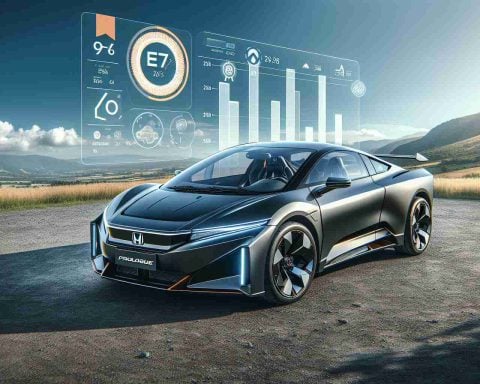- The EV battery recycling market is projected to grow from USD 0.54 billion in 2024 to USD 23.72 billion by 2035, highlighting its critical role in resource management and sustainability.
- Recycling lithium, cobalt, and nickel from batteries is more cost-effective and environmentally friendly than mining new materials.
- Global governments enforce strict policies, requiring manufacturers to recycle at least 65% of a battery’s weight by 2025 and 70% by 2030.
- Partnerships like the one between BMW of North America and Redwood Materials exemplify how companies can collaboratively enhance battery material recovery.
- The industry not only focuses on recovering resources but also on creating a sustainable system that aligns with environmental goals.
Amidst a global pivot towards electrification, the electric vehicle (EV) battery recycling market stands as a beacon of innovation and sustainability. With projections soaring from USD 0.54 billion in 2024 to a staggering USD 23.72 billion by 2035, this burgeoning sector reflects more than just numbers—it heralds a revolution in resource management and environmental stewardship.
The need to harness and recycle valuable raw materials like lithium, cobalt, and nickel drives this transformation. Excavating these materials anew is costly and environmentally taxing; hence, recycling offers a cheaper, greener alternative. Picture recyclers deftly recovering precious metals from retired batteries, ushering in an era where old fuels new without the shadow of mining’s ecological footprint.
Manufacturers are no longer passive players. Worldwide, governments implement stringent policies that demand accountability, pushing companies to innovate and meet rising recycling targets. By 2025, battery makers are required to reclaim 65% of a battery’s weight, a figure climbing to 70% by 2030. This regulatory push echoes across Europe, where legislative zeal embraces circular economies and local supply chains.
Take the recent partnership between BMW of North America and Redwood Materials—a symbiosis extracting and reusing a vast majority of their vehicle’s battery materials. Such alliances are reshaping the narrative of waste, converting it into a story of renewable potential.
Innovation isn’t just about reclaiming resources; it’s about envisioning a sustainable loop where electric dreams meet practical recycling realities. In this electrified age, the challenge lies not just in driving change but in ensuring that the path is paved with green steps, resonating with a world eager for smarter, sustainable futures.
The Untapped Potential of the EV Battery Recycling Market: What You Need to Know
How-To Steps & Life Hacks for Sustainable Recycling
1. Identify Recycling Partners: For individuals and businesses, finding local recycling centers that handle EV batteries is crucial. Check reputable directories or manufacturer guidelines for options.
2. Prepare Batteries for Recycling: Ensure batteries are intact and safe to transport. Consult with recycling partners for specific preparation steps to reduce risks during transportation.
3. Encourage Circular Economy Practices: Engage with manufacturers that prioritize recycled materials in their new battery production, supporting a closed-loop system.
Real-World Use Cases
– Automotive Industry: Companies like BMW are leading the way by collaborating with firms such as Redwood Materials to efficiently recycle EV batteries, significantly reducing production costs and environmental impact.
– Renewable Energy Storage: Recycled battery materials are increasingly being used in energy storage solutions for solar and wind energy systems, ensuring a sustainable supply chain.
Market Forecasts & Industry Trends
The EV battery recycling market is expected to grow from USD 0.54 billion in 2024 to USD 23.72 billion by 2035, according to industry projections. This growth is driven by stricter regulations and the increasing environmental awareness of consumers.
Reviews & Comparisons
– BMW and Redwood Materials: This partnership is a benchmark in EV recycling with efficient processes for extracting and reusing materials, showcasing best practices in the industry.
– Tesla: Tesla has developed an in-house system for battery recycling, aiming to achieve a closed-loop battery recycling approach, minimizing waste, and optimizing resource reutilization.
Controversies & Limitations
While the benefits are clear, challenges such as the initial setup cost of recycling facilities and the current recycling technology’s limitations can hinder progress. The environmental impact of recycling processes themselves, such as emissions and energy consumption, is also a concern.
Features, Specs & Pricing
The specifics of battery recycling systems vary, but key features include:
– Advanced separation technologies that ensure high recovery rates of valuable materials like lithium and cobalt.
– Competitive pricing models as technology matures, with costs anticipated to decrease as the market expands.
Security & Sustainability
Battery recycling enhances national security by reducing dependence on imported raw materials and ensures sustainability through decreased mining activities and conservation of exhaustible resources.
Insights & Predictions
Analysts predict that as the EV market expands, recycling practices will become more efficient and widespread, potentially lowering the overall cost of EV batteries and increasing accessibility.
Tutorials & Compatibility
– Online Courses: Many institutions now offer certifications in battery recycling technologies, equipping engineers with necessary skills for this evolving field.
– Compatibility with Industry Standards: Ensuring that recycling practices meet international safety and environmental standards is crucial for global market integration.
Pros & Cons Overview
Pros:
– Reduces environmental impact and raw material dependency.
– Expands local economies through new jobs in recycling sectors.
– Drives down the cost of future EV products.
Cons:
– High initial costs and technological barriers.
– Potential emissions from recycling processes.
Actionable Recommendations
1. Stay Informed: Keep up with legislative developments around EV recycling to understand upcoming changes in recycling standards and requirements.
2. Support Sustainable Brands: Prioritize purchasing from companies actively involved in recycling endeavors to encourage sustainable business practices.
3. Educate and Advocate: Share knowledge about the importance of battery recycling within your community to promote grassroots sustainability efforts.
For more information on EV trends and sustainable practices, visit Automotive Industry.


















